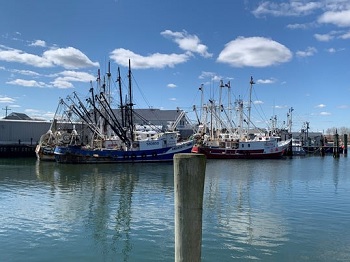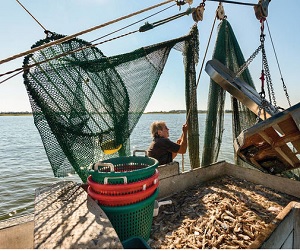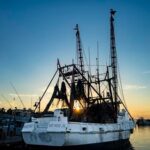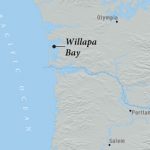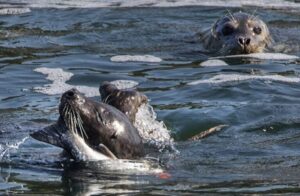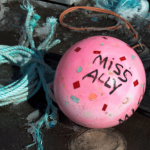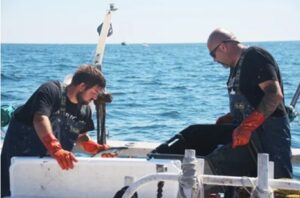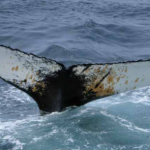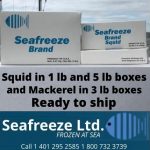Category Archives: South Atlantic
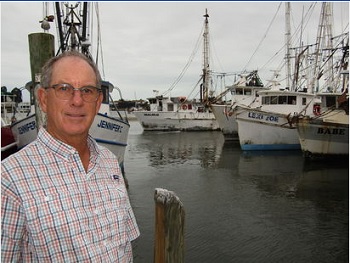
In search of aid: Congress pushing for help to local fishing industry battered by Coronavirus
In Southwest Florida, perhaps no other industry makes its mark so directly on the culture and day-to-day life of its tourism business as the fishermen who supply the seafood to local restaurants. With most of the major restaurants that serve seafood to diners closed since last month (except for those serving takeout) in response to the coronavirus, the fishing industry has taken a major hit locally.,, Erickson said the economic downturn caused by the coronavirus pandemic and subsequent shutdown measures have “hurt our market with all of these restaurants closed down because so much seafood is eaten at restaurants.” >click to read< 08:17
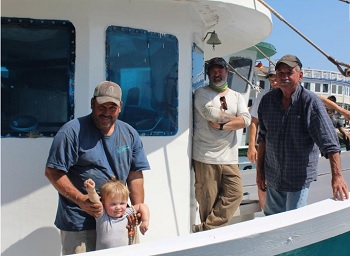
Shem Creek blessing
On Tuesday, April 14 there was a downscaled version of the Blessing of the Fleet ceremony without the Seafood Festival and the large crowds. A more private family gathering took place on the Shem Creek Park side of the creek with several shrimping trawlers docked and ready for the start of the provisional season on Wednesday, April 15. Chaplain Jeff Wallace of Charleston Port and Seafarers Society blessed each vessel with holy water and prayed that each would have a bountiful season for a bountiful season for each. Boats included: Winds of Fortune, Eleanor Paige, Miss Bridget, The Family Thing and the Lady J were all blessed at the ceremony. 20 photo’s, >click to read< 15:13
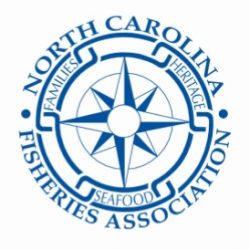
North Carolina Fisheries Association Weekly Update for April 17 2020
Legislative updates, Bill updates, Calendar, >Click here to read the Weekly Update<, to read all the updates >click here<, for older updates listed as NCFA >click here< 16:44
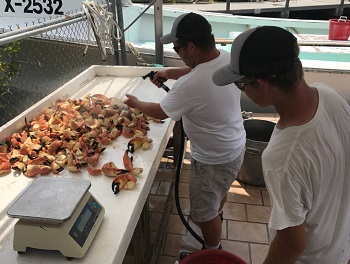
First a hurricane, then an algae bloom. Now Keys fishermen try to weather the coronavirus pandemic
This day’s haul was a good catch — hundreds of claws ranging in size from large to “colossal.” But this was among the last trips the crew of the Risky Business II will make this season to harvest the Florida delicacy. With restaurants mostly closed due to the coronavirus pandemic, Piton and most other Keys commercial anglers are calling it an early season, which is scheduled to end May 10. Piton, 54, has been in the lobster and crab business for nearly 40 years and is among the most successful operators in the Keys. He said he’ll be able to weather the pandemic, but he feels for the many other commercial anglers who won’t. video, >click to read< 10:37
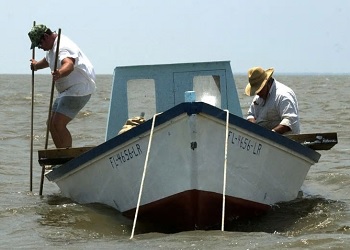
Florida warns of Apalachicola River’s ‘doom’ if Georgia isn’t forced to release more water, Looks to US Supreme Court
Warning that a special master’s recommendation would “spell doom” for the Apalachicola River, Florida wants the U.S. Supreme Court to require Georgia to share more water in a river system that links the two states. “The harm to the Bay’s oyster fisheries is undeniable. Apalachicola is renowned across America for its oysters, which account for 90% of Florida’s oyster harvest and 10% of the nation’s,” “What’s more, oysters, and oystering, have created a distinct way of life in Apalachicola passed down from generation-to-generation; whole communities depend on the fisheries for their economic livelihood. The oyster is to Apalachicola what the lobster is to many New England towns.” >click to read< 10:23
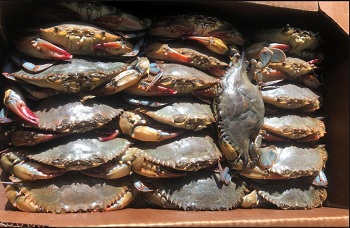
Soft-shell crab season is ‘the start of all the good stuff’
One local delicacy seafood is quite popular in the Lowcountry this time of year. Soft-shell crabs, or female blue crabs, are being caught, sold and cooked in homes and restaurants along the state’s coast. Callinectes sapidus or “beautiful swimmers” are more commonly referred to as Atlantic blue crabs. Although they can be caught all year long, the peak molting, or shedding process, of a female crab’s exoskeleton to create the soft-shell normally occurs during the springtime in South Carolina saltwater. “The timing is dictated by the crabs, and when they molt is really dictated by water temperatures. So in our waters, molting can occur year round, but the peak of molting for these females is really in the April-May,, photo’s, >click to read< 13:52
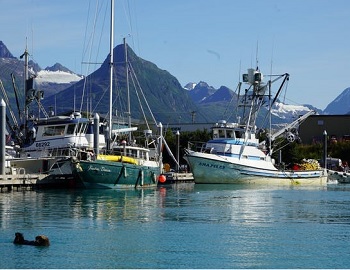
While coronavirus threatens seafood economy, community fisheries find ways to stay afloat
Major commercial fisheries, including the iconic Maine lobster fisheries, have ground to a halt.,, Consider the lucrative Pacific halibut fisheries, which opened in mid-March. These fisheries largely serve fine dining restaurants. Combined with the loss of sales to markets like China, seafood producers from east to west are without a market for their product. Combined with the loss of sales to markets like China, seafood producers from east to west are without a market for their product. But decades of globalization, industrialization and environmental change have brought many coastal communities to the brink, because of coastal development, climate change or they’ve lost fishing rights to industry consolidation. To meet this moment, many need more than just an invigorated customer base. >click to read< 12:16

With Coronavirus pandemic ravaging our country, temporary relaxation of fishery regulations is urged to help fishing industry
Thanks to our Senators and Congressmen who worked to get specific aid to the fishing industry, that has been hit particularly hard by the closure of restaurants, where 70 per cent of seafood in this country is consumed. Fishermen and wholesalers have had to adapt on the fly and find other ways to market their product to various degrees of success. The closure of so many vital aspects of our domestic economy will have effects that will still be felt a long time after the Virus is tamed.,, I am requesting that NMFS immediately contact the various management councils and commissions to request that special meetings [webinars] of fishery advisory panels be held to discuss the pro’s and cons of this idea, and what fisheries could benefit.,,, By Jim Lovgren. >click to read< 20:48
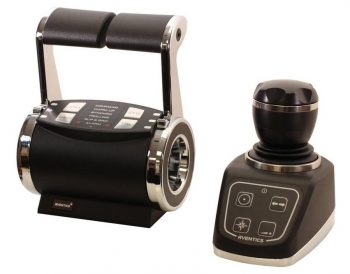
Reeling in the Benefits of Upgraded Boat Controls With An Electronic Control System
The Challenges of Push-Pull Cable Systems. When the bluefin tuna season ends in Gloucester, it’s only getting started in North Carolina—drawing northern fishermen to the tumultuous seas of the Outer Banks. The ensuing competition between northern fishermen and their southern counterparts spawned the spin-off series, “Wicked Tuna: Outer Banks,” which spotlights Marciano and several other boats from the original series. Being a contender in this high-stakes competition requires the latest in boat control technology, something Marciano needed to upgrade. As fate would have it, Steve Vincent, Manager of Business Development Marine at Emerson, was a fan of the “Wicked Tuna” series. “When I watched the show, I noticed the boats still integrated mechanical levers,” Vincent says. “Right away, he saw the benefits and possibilities,” >click to read< 10:45

Coronavirus: Letter from 200+ US seafood industry stakeholders to Trump Administration
March 24, 2020, Dear President Trump. We write as participants in America’s seafood supply chain, a critical component of the country’s domestic food infrastructure and one of the major economic drivers in our country’s coastal communities and states. Empty restaurants, cafes, and dining halls are a visible reminder of the ongoing, unprecedented public health efforts to blunt the spread of COVID-19. The livelihoods of the chefs, cooks, servers, and other staff are obvious and direct casualties of those government efforts. The economic disruption caused by forced restaurant closures and active encouragement for Americans to “shelter in place,” however, extend far beyond the food service sector. >click to read< 19:37

Believe it or not, now is your time
Greetings Shrimpers of the South, and commercial fishermen across the nation. My name is Ed Blaine, and in light of the Coronavirus mayhem we’re all experiencing, believe it or not, now is your time. I’ve been talking to Shrimpers, and the imports of shrimp from foreign sources have stopped. This is an opportunity to take advantage of, and not ignore the fact that 92% of the seafood consumed in this country is imported from overseas, and we have a chance to fix that. Prices are up for your domestic product, as the availability of that cheap, inferior, imported stuff has dried up. >click to read< 15:12

Senate Democrats, Greens Seek Climate Mandates In Federal Stimulus Bills
Senate Democrats and environmentalists want to tack climate change mandates onto proposed federal aid to major airlines and cruise lines reeling from the coronavirus pandemic. In a letter to the House and Senate leadership, eight Senate Democrats said last week that any financial assistance to the travel industry “should be paired with requirements that companies act in a more responsible fashion” by reducing their carbon footprint. “Climate change damages will wreak havoc on a scale even greater than the coronavirus,” said the Friday letter headed by the Center for Biological Diversity. Democrats who signed the letter were Sens. Sheldon Whitehouse of Rhode Island, Martin Heinrich of New Mexico, Jeffrey Merkley of Oregon, Cory A. Booker of New Jersey, Edward Markey of Massachusetts, Richard Blumenthal of Connecticut, Tina Smith of Minnesota and Debbie Stabenow of Michigan. >click to read< 10:12
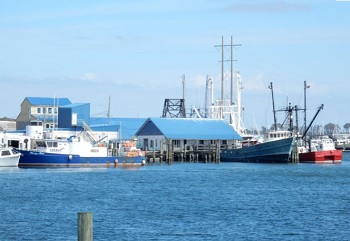
Coronavirus: North Carolina fishermen, seafood dealers work through industry changes due to outbreak
N.C. Gov. Roy Cooper issued an executive order Tuesday closing restaurants and bars to dine-in service. Additionally, the U.S. Centers for Disease Control and Prevention has issued guidance recommending people avoid large gatherings and to practice social distancing to prevent the spread of COVID-19. As a result, commercial fishermen, including for-hire and charter fishermen, have been “significantly impacted,” according to N.C. Fisheries Association President Glenn Skinner. “While it’s too early to predict the long-term impacts, it appears they will be devastating if the current situation continues for any length of time.” >click to read< 06:21
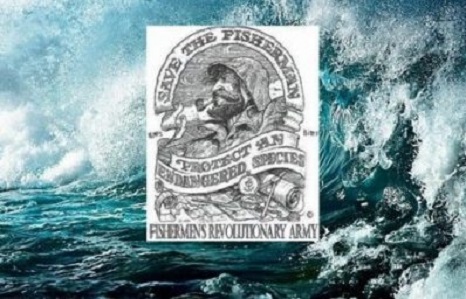
Tell Your Congressmen and Senators: Our US Fishing Industry Faces The Coronavirus Disaster
With the Coronavirus being spread around the world and nations reacting to this threat in many different ways, from doing nothing, to closing the borders and full quarantines, the unintended effects of such government actions have yet to be fully felt. Granted the stock market has lost 30% in value in just 3 weeks time, the average American really doesn’t feel that unless he is living on his investment returns. With the closing of schools, and restaurants and any places of public gatherings an enormous crisis is being created because many people are being put out of work and some of them may not have a business to come back to when the crisis is over. The Coronavirus may topple an empire if we let it. >click to read< 06:17
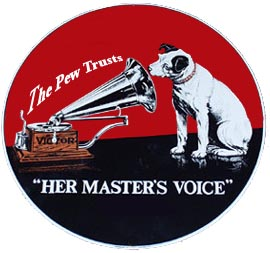
“Looking Back”: The Keep Fishermen Fishing Rally
Measured by any meaningful criteria the Keep Fishermen Fishing rally held on the steps of the Capitol on March 21 was a stunning success. It was attended by thousands of fishermen from as far away as Alaska, twenty one Senators and Members of the House of Representatives, and at least a half a dozen other VIPs made room in their busy schedules to come out and address the people who attended. From the most conservative of the conservatives to the most liberal of the liberals, these politically divergent speakers had one message; fix the Magnuson Act and bring back the balance between conservation and harvest. For the second time at the national level recreational and commercial fishermen – no matter what fisheries they participated in, no matter what their disagreements on allocation or lesser issues were, and no matter where they were from – were standing together and demanding a return to the original intent of the Magnuson Act;,,, >click to read< 08:09
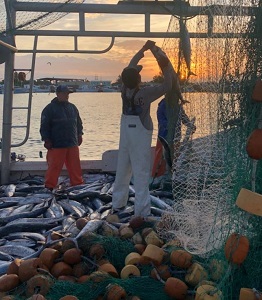
Marathon kids grow up to be industry professionals
When visitors and locals pour in to the Original Marathon Seafood Festival this weekend, they’ll be thinking about the tasty seafood. Maybe they’ll wonder about the commercial fishermen who do battle to provide the delicacies. Few will consider how young some of these fishermen are. Well, we GROW fishermen in the Keys. They come out of the womb and, seemingly, in no time they’re holding a pole. Or driving the boat. Or working the stern. That’s the case for two young men from Marathon — Cole McDaniel, 16, and Tony Palma, 15. They do it for fun and they do it for work. more, >click to read< 17:24

North Carolina Fisheries Association Weekly Update for March 13, 2020, Industry Funded Economic Survey reminder
Legislative updates, Bill updates, Calendar, >Click here to read the Weekly Update<, to read all the updates >click here<, for older updates listed as NCFA >click here< Industry Funded Economic Survey: It is very important that all fishermen fill out this survey and return it. This information is so NC can get an accurate value for our fishing industry. Deadline will be March 20, 2020. If you have not received an economic survey, or have questions, please contact Chris Dumas 910-962-4026 or via email [email protected] 11:19
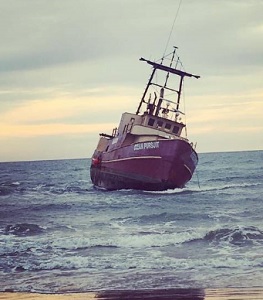
Efforts begin to remove grounded vessel off Oregon Inlet
Collaborative efforts have begun to remove a fishing vessel that was grounded off of Oregon Inlet on the night of February 29. The crew of the 72-foot scallop boat were safely removed by an air crew from U.S. Coast Guard Air Station Elizabeth City the following morning, and until the vessel is towed away, it still remains stranded about 50 yards near the shoreline, and roughly a half mile south of ORV Ramp 4 on Bodie Island. more, >click to read< 19:08

House passes shark fin ban with carveout for domestic fishermen by Rep. Toby Overdorf amendment
The House passed the Senate version of a bill (SB 680), which outlaws the import and export of fins to or from Florida. Rep. Toby Overdorf offered an amendment essentially gutting the bill,, The amendment permits the “sale of shark fins by any commercial fisherman who harvested sharks from a vessel holding a valid federal shark fishing permit on January 1, 2020. The export and sale of shark fins by any wholesale dealer holding a valid federal Atlantic shark dealer permit on January 1, 2020.” more, >click to read< 16:24

A fishing vessel grounded near Cape Hatteras National Seashore
A fishing vessel grounded near Cape Hatteras National Seashore the morning of March 1st. As of this morning, the scallop boat remains grounded approximately 50 yards from shore. The U.S. Coast Guard safely removed all crew members via helicopter the day the vessel grounded off Bodie Island. It’s currently located roughly a half mile south of ORV Ramp 4. photos, >click to read< >more here<, and >here< 11:52
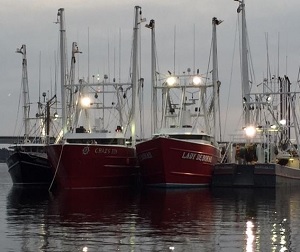
Federal fishries disaster funds granted To NC Fishing Industry
North Carolina will receive $7.7 million in federal fisheries disaster assistance to help the State’s fishing industry recover from Hurricane Florence. An assessment from the National Oceanic and Atmospheric Administration estimated that the September 2018 storm caused $38 million in damages to vessels and businesses and nearly $57 million in lost revenues. >click to read< 19:33

Shark fin ban ready for Senate floor
The Senate Rules Committee passed the bill (SB 680), which outlaws the import and export of fins to or from Florida. Jerry Sansom of the Organized Fishermen of Florida said Florida has more fisherman than any other state licensed by the federal government to participate in the heavily regulated and fully sustainable practice of capturing sharks. He noted a sunset on the finning ban in 2025 he says signals legitimate concern about the commercial future of those fishermen. “I don’t remember when the Florida Senate has put an expiration date on an industry before they made us come back and get a pardon,” >click to read< 14:46
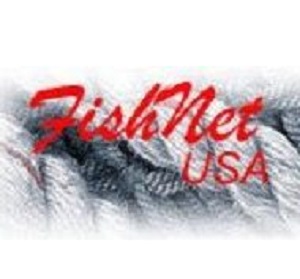
“With a bit of prodding by some valued colleagues”, we will be launching a series “Looking Back”
A few of us were conversing, and the topic of resurrecting’s some of the posts, pages, and information of the past to gauge the changes and improvement’s achieved though the past few decades of fishery management and sacrifice, or if there have been any improvements at all! Nils Stolpe, Jim Lovgren, and I thought perhaps these various posts and articles would give an indication of how the domestic fishing is doing! Both of these gentlemen are exceptional writers, with exceptional knowledge of the domestic fishing industry and they have been featured here many times. We hope people revisit these articles, and for many of the newer fishermen in the industry today, this may be the first exposure to this interesting, and valuable info, and other stories. We’ll kick it off with “With a bit of prodding by some valued colleagues,” >click to read< 13:07

North Carolina Fisheries Association Weekly Update for February 21, 2020 February 28, 2020
Legislative updates, Bill updates, Calendar, >Click here to read the Weekly Update<, to read all the updates >click here<, for older updates listed as NCFA >click here< 12:30

Managing A Lucrative Resource In The Face Of Climate Change
Conservationists and commercial fishing industry leaders came together on the need to restructure the Magnuson-Stevens Fishery Conservation and Management Act to adequately consider climate impacts during a panel discussion in Honolulu. But that was about it for the common ground they found during the last stop on U.S. Rep. Jared Huffman’s nationwide “listening tour” on reforming the MSA. The panelists, which also included state and federal officials, had diverging views on the effectiveness of marine national monuments like Papahanaumokuakea and whether the eight regional councils that the law set up to manage fishery resources nationally should have designated seats to ensure representation from environmental, indigenous and scientific interests as well as the commercial fishing industry. >click to read< 10:38
What ever happened to HR-200? I have no interest in these people reauthorizing anything.
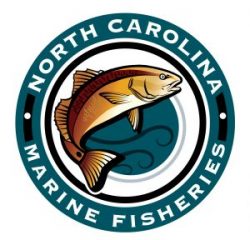
North Carolina Division of Marine Fisheries to begin industry funded survey of shrimp trawl fishermen
The N.C. Division of Marine Fisheries will begin contacting shrimp trawl and skimmer trawl vessel operators in the coming weeks for a survey about the types of gear they use. The division wants to know what bycatch reduction devices and turtle excluder devices are currently used in the North Carolina commercial shrimp fishery. The survey also includes questions about overall gear configurations, as well as some socioeconomic information, such as costs and revenues of the shrimping business.The survey is being conducted at the request of the Marine Fisheries Commission and the commercial fishing industry. The survey is funded by the North Carolina Commercial Fishing Resource Fund, which receives money from commercial fishing license sales and supports a grant program that is managed by commercial fishing industry stakeholders. >click to read< 10:22

North Carolina Fisheries Association Weekly Update for February 21, 2020
Legislative updates, Bill updates, Calendar, >Click here to read the Weekly Update<, to read all the updates >click here<, for older updates listed as NCFA >click here< 14:50






